Monthly Archives: December 2009
Godron, Dominique Alexandre
Dominique Alexandre Godron (1807-1880) was a French botanist and professor of natural history at Nancy University, who, in 1868, founded 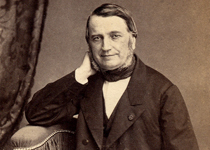 “The School of Atlantis” in North Africa. Godron believed that Atlantis was to be found in the Sahara desert and delivered a series of lectures(a) on the subject at the University. Both Godron and Berlioux were inspired by the writings of Diodorus Siculus who wrote extensively about ancient North Africa.
“The School of Atlantis” in North Africa. Godron believed that Atlantis was to be found in the Sahara desert and delivered a series of lectures(a) on the subject at the University. Both Godron and Berlioux were inspired by the writings of Diodorus Siculus who wrote extensively about ancient North Africa.
>Atlantisforschung informs us that Godron was also interested in pre-Columbian voyages to America by Asian and European seafarers at the same time, and published at least two papers on this(b).<
Godron was known to have corresponded with his contemporary Charles Darwin, on botanical matters.
Sydenham, Floyer (M)
Floyer Sydenham (1710-1787) was scholar of Ancient Greek and one of the first to translate nine of the dialogues of Plato into English.
Unfortunately, he died in prison, incarcerated for non-payment of a small debt to an innkeeper, before he could finish his work, which was later completed by Thomas Taylor.
Reclus, Onésime
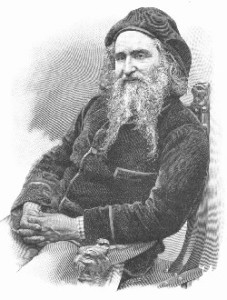 Onésime Reclus (1837-1916) was a French geographer who published L’atlantide, pays de l’atlas: Algérie-maroc-tunisie [0523]+ in which he expressed his conviction that Atlantis was located in North-West Africa in Morocco, Algeria and Tunisia, collectively known as the Maghreb. The Berbers call the Maghreb ‘Tamazgha’, or Land of the Imazighen (plural of Amazigh).
Onésime Reclus (1837-1916) was a French geographer who published L’atlantide, pays de l’atlas: Algérie-maroc-tunisie [0523]+ in which he expressed his conviction that Atlantis was located in North-West Africa in Morocco, Algeria and Tunisia, collectively known as the Maghreb. The Berbers call the Maghreb ‘Tamazgha’, or Land of the Imazighen (plural of Amazigh).
Reclus is credited with coining the word ‘francophone’.
The Atlantisforschung website commented on Reclus’s book, “newly published in 2013, in which the author locates the ancient Atlantean empire in the Maghreb (mainly in Algeria, Morocco and Tunisia ), reveals a thoroughly complex, polydisciplinary treatment of the research subject that suggests a long-term involvement with the matter. Thus Onésime Reclus introduced geographic as well as ethnological, linguistic and historical arguments, such as quotes from classical antiquity authors and later Arab and Jewish historians, in support of his assumptions.(b)“
Reclus had a brother, Elisée (1827-1904), who was an anthropologist, an active anarchist and also a believer in the reality of Atlantis.
[0523]+ https://gallica.bnf.fr/ark:/12148/bpt6k5804476p.r=atlantide.langFR *
(a) https://atlantisforschung.de/index.php?title=Onésime_Reclus
Baër, Carl Friedrich
Carl Friedrich Baër was Swedish, but lived in Paris where he was pastor at the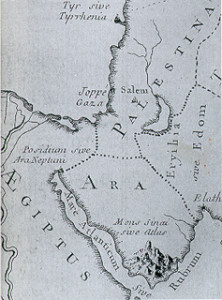 Lutheran chapel in the Swedish embassy (1742-1784). He believed that Plato’s Atlantis story was a corruption of Bible history and that in fact Atlantis was located in the Holy Land. He went further and attempted to link the twelve tribes of Israel with the ten kings of the Atlantean federation. On one of the maps in his book, first published in 1762[140], he placed the Atlas Mountains in modern Yemen and has the Red Sea named as Mare Atlanticum, presaging the more recent work of Jaime Manuschevich. Furthermore, Baër links the destruction of Atlantis with the biblical story of the demise of Sodom and Gomorrah.
Lutheran chapel in the Swedish embassy (1742-1784). He believed that Plato’s Atlantis story was a corruption of Bible history and that in fact Atlantis was located in the Holy Land. He went further and attempted to link the twelve tribes of Israel with the ten kings of the Atlantean federation. On one of the maps in his book, first published in 1762[140], he placed the Atlas Mountains in modern Yemen and has the Red Sea named as Mare Atlanticum, presaging the more recent work of Jaime Manuschevich. Furthermore, Baër links the destruction of Atlantis with the biblical story of the demise of Sodom and Gomorrah.
His book, in French, can now be read or downloaded online(a).
Müller, Hieronymus
Hieronymus (Jerome) Müller (1785-1861) was a German philologist who produced a well received German translation of Plato’s works, published in Leipzig in 1856.
Thorwald C. Franke has also included Müller’s German translation along with that of Susemihl and the English translations of Bury and Jowett, together with the Greek text of John Burnet[1492], all in a parallel format(a).
Müller is reputed to have identified Lyktonia with Atlantis.
(a) https://www.atlantis-scout.de/atlantis-timaeus-critias-synopsis.htm
Maldive Islands
The Madive Islands, in the Indian Ocean, have absolutely nothing to do with Plato’s Atlantis, in 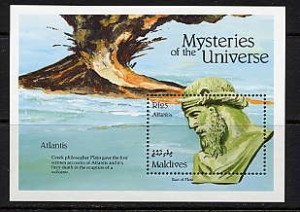 spite of which, in 1992, the postal authorities there apparently issued a stamp commemorating the mystery of Atlantis. There may be some question about the authenticity of this issue as it might have been printed just as a revenue raising exercise
spite of which, in 1992, the postal authorities there apparently issued a stamp commemorating the mystery of Atlantis. There may be some question about the authenticity of this issue as it might have been printed just as a revenue raising exercise
Shermer, Michael
Michael Shermer (1954- ) is the founding publisher of Skeptic magazine and Skeptic.com. For eighteen years he wrote the ‘skeptic’ column for Scientific American(h).
Suffering as he does from terminal scepticism, Shermer could not resist offering his views on Atlantis(a), which  basically assume that Plato created the myth of Atlantis to support his political philosophy. This idea has been put forward by many sceptics. However, nobody seems to have suggested that while Plato may have been promoting his political philosophy with the Atlantis story, there is absolutely no reason why he could not have been using real historical events to achieve the same result. This explains how the late Professor Antonis Kontaratos was able to point out at the 2005 Atlantis Conference that Plato states directly and indirectly, twenty-two times, in both Timaeus & Critias, that the story of Atlantis is true [629.79].
basically assume that Plato created the myth of Atlantis to support his political philosophy. This idea has been put forward by many sceptics. However, nobody seems to have suggested that while Plato may have been promoting his political philosophy with the Atlantis story, there is absolutely no reason why he could not have been using real historical events to achieve the same result. This explains how the late Professor Antonis Kontaratos was able to point out at the 2005 Atlantis Conference that Plato states directly and indirectly, twenty-two times, in both Timaeus & Critias, that the story of Atlantis is true [629.79].
I should note here the comment of Martin Ebon that “the narrative, unlike the Republic, espouses no particular theory and reads more like historical fact, however confusing, than a myth.”[286.16]
Shermer does accept that Plato mixed history with myth but does not suggest how we might separate the two, instead, he is content to dispose of both baby and bath-water. I consider fatuous, his comment that “Plato’s Atlantean dialogues are essentially an ancient Greek version of Star Wars.” This silly comparison was recently (2018) echoed on an Australian website(d).
Georgeos Diaz-Montexano responded to Shermer’s views with a 2005 article, contentiously entitled Errors, Fallacies and Lies.
Shermer wrote an article(b) for Scientific American (Jan.1.2016) on the subject of ‘Homo Naledi, which generated a highly critical response, noting that “Shermer preferred to speculate without evidence and publish an essay without fact-checking.” Even Shermer nods!
>Some years ago Rod Martin wrote a short but interesting paper grading the arguments of some of the better-known Atlantis sceptics, such as Shermer and Kevin Christopher(i)
In a 2017 article in Scientific American, Shermer offered a highly critical review(f) of Graham Hancock’s Magicians of the Gods.<
However, to give credit where credit is due I must acknowledge that recently (2020) Shermer, among others, has back-pedalled on their previous sustained opposition to the idea of the Younger Dryas Impact Hypothesis(e). The impetus for this volte-face seems to have been provided by James Lawrence Powell, also a former sceptic, and his book, Deadly Voyager [1911].
In June 2023, Shermer published an article in Skeptic magazine attacking Graham Hancock‘s theories in general and the Netflix 2022 eight-part series Ancient Apocalypse(g) in particular.
(a) https://michaelshermer.com/sciam-columns/myth-is-the-message/#more-52
(b) https://www.scientificamerican.com/article/did-this-extinct-human-species-commit-homicide1/
(c) Michael Shermer: Murdering the facts about Homo naledi? – john hawks weblog (archive.org)
(e) In praise of intellectual honesty – The Cosmic Tusk
(f) No, There Wasn’t an Advanced Civilization 12,000 Years Ago – Scientific American
(h) https://michaelshermer.com/sciam-columns/
(i) Mission: Atlantis, by Rod Martin, Jr. — Grading the Skeptics (archive.org) *
Chowdhury, Alapan Roy
 Amlan Roy Chowdhury holds a Master’s degree in Anthropology from Calcutta University. His website(a) has a number of interesting articles including one on Atlantis, which is supportive of the idea that the Vedic Civilisation, which lasted until the 6th century BC, could have been the remnants of Atlantis. He suggests further that emigrants from ancient India influenced other cultures in both the west and east.
Amlan Roy Chowdhury holds a Master’s degree in Anthropology from Calcutta University. His website(a) has a number of interesting articles including one on Atlantis, which is supportive of the idea that the Vedic Civilisation, which lasted until the 6th century BC, could have been the remnants of Atlantis. He suggests further that emigrants from ancient India influenced other cultures in both the west and east.
He also expands on these ideas in a number of papers on the Academia.edu website(b).
However, Chowdhury’s focus is on the evidence for early Indian influences in the culture of ancient Egypt(c-f).>Abo Rashad has published a list of similarities(g).<
(a) IS VEDIC CIVILIZATION THE REMNANTS OF THE LEGENDARY ATLANTIS | Vedic Vidyalay ????? ???????? (archive.org) (26 pages)
(b) (99+) (DOC) ATLANTIS: THE BHAARATIYA VERSION | Alapan Roy Chowdhury – Academia.edu
(c) (99+) (DOC) BHAARATIYAS IN EGYPT | Alapan Roy Chowdhury – Academia.edu
(d) (99+) BHAARATIYAS IN EGYPT (Part-2) | Alapan Roy Chowdhury – Academia.edu
(e) (99+) BHAARATIYAS IN EGYPT (Part-3) | Alapan Roy Chowdhury – Academia.edu
(f) (99+) BHAARATIYAS IN EGYPT (Part-4) | Alapan Roy Chowdhury – Academia.edu
(g) Archive 2723*
Dee, John
Dr John Dee (1527-1608) was born in London of Welsh parentage. Although he was a polymath, he was never a doctor. He was reputed to have had the largest library in England at that time, holding 3,000 books and 1,00 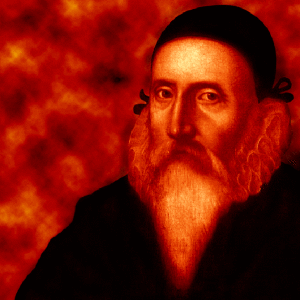 manuscripts. Dee was court astrologer to both Mary Tudor and Queen Elizabeth I and it is widely believed that he was the founder of the Rosicrucian Order. His principal published work is Monas Hieroglyphica (1564). Dee is also credited with coining the phrase ‘Brytish Impire’.
manuscripts. Dee was court astrologer to both Mary Tudor and Queen Elizabeth I and it is widely believed that he was the founder of the Rosicrucian Order. His principal published work is Monas Hieroglyphica (1564). Dee is also credited with coining the phrase ‘Brytish Impire’.
Some consider that Dee’s life had been the inspiration for the work of a number of his literary contemporaries, including two plays, Doctor Faustus by Christopher Marlow and The Tempest by William Shakespeare.
Further information about Dee is available on a dedicated Internet site(a) and a 2015 reappraisal of his life can be read on another(b).
Dee, like many others, was convinced that the newly discovered American continent was in fact Atlantis and prepared a map of the New World for Queen Elizabeth I with one side marked Atlantis. This view he shared with Francis Bacon.*Until Dee, Atlantis speculation had been centred on Spanish Central America, but Dee moved it into British territory in North America.*
(b) https://boingboing.net/2015/02/19/john-dee-was-the-real-life-mer.html
Magoffin, Ralph van Deman
Ralph van Deman Magoffin (1874-1942) was the nephew of Esther Boise Van Deman (1862–1937), a  leading archaeologist of the late 19th and early 20th centuries.
leading archaeologist of the late 19th and early 20th centuries.
In his own right, Magoffin was a professor of classical archaeology at John Hopkins University in Baltimore, Maryland and was also honorary president of the Archaeological Institute of America.
He is credited by Hatcher Childress[620.101] as having been a supporter of Crete as the location of Atlantis, in his 1929 book, The Romance of Archaeology [1383]+. This idea was very much in vogue in the early decades of the 20th century. In fact, the following year Magoffin expanded on his views in his Lure and Lore of Archaeology [1384.34]+ when he wrote that Atlantis was “first probably a traditionalized Crete, and then successively Sicily and one of the Cape Verde islands, as discovery compelled Atlantis to recede westward ahead of geographical certainty.”
[1383] Read online: https://archive.org/details/romanceofarchaeo00mago *
[1384] https://babel.hathitrust.org/cgi/pt?id=uc1.b3143453;view=1up;seq=1 *
